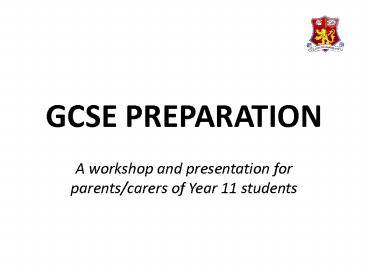GCSE PREPARATION - PowerPoint PPT Presentation
1 / 24
Title:
GCSE PREPARATION
Description:
Leave us alone if s/he left me alone I might actually do some revision ... Money/biscuits to revise please! Y12. The count down to GCSEs. How many weeks to go? ... – PowerPoint PPT presentation
Number of Views:106
Avg rating:3.0/5.0
Title: GCSE PREPARATION
1
GCSE PREPARATION
- A workshop and presentation for parents/carers of
Year 11 students
2
What the students say!
- Keep your nose out coz its so annoying
- Stop nagging
- Leave us alone if s/he left me alone I might
actually do some revision - Keep the house quiet and siblings under control
- Dont force us to make a revision timetable
- Money/biscuits to revise please!
Y12
3
The count down to GCSEs
- How many weeks to go?
- Study leave?
- Study rooms on exam days
- Examination calendar
- Examination boards
- Results day
- HJM
4
What the school is doing
- All subjects will carry out revision sessions
once the syllabus and coursework has been
finished - Work is done on past papers and exam technique in
subjects - The PSHE programme /assemblies have already
looked at revision techniques and styles - HJM
5
What the school is doing
- Subject teachers will make students crystal clear
of what is exactly required in each subject - During study leave, teachers are not on hand to
give instant advice. However, if a student has
problem at this time, they should try and contact
the teacher at school to arrange a good time to
come in - HJM
6
Put your child in charge
- Give them choices
- Allow them to work out strategies
- Talk through their plans with them to allow them
to reflect on them/modify them - Group revision sessions
- SCW
7
The conversation
- Why should you revise?
- Where should you revise?
- When should you revise?
- How should you revise?
- How often should you revise?
- SCW
8
They dont do it the way we did!
- Silence? i-pod?
- Sitting at a desk?
- Computer access?
- Use of internet?
- On their own?
- Clock?
- Lighting?
- Phone?
- Food?
- Y12
9
The most effective revision time
- The concentration span in minutes of a person is
their age, plus or minus one. This means that
the concentration span of a 16 year old is 15 to
17 minutes - Take a break, All work and no play
- Begin revising as early as possible, the more
they do the easier it becomes. Optimum is 6-8
weeks - JCD
10
How should they revise?
If you just sit down to revise, without a
definite finishing time, then your learning
efficiency falls lower and lower, like this
11
How can they improve this?
If they decide at the beginning how long they
will work for, with a clock, then as the brain
knows the end is coming, the graph rises towards
the end
12
How can you improve this even more?
If you break up a 2-hour session, into 4 shorter
sessions, each of about 25-minutes, with a short
planned break between them, then it is even
better. Compare the next 2 graphs
13
One solid session
4 shorter sessions The yellow area shows the
improvement.
14
How often should they revise?
Look at the graph below
It shows how much your brain can recall later. It
rises for about 10 minutes and then falls.
15
However,
if they quickly re-revise after 10 minutes, then
it falls more slowly! This is good. Analyse the
new graph
16
Even better,
if you quickly re-revise again, after 1 day, then
it falls even more slowly! Good ! Analyse the
new graph
17
And even better still,
if you quickly re-revise again, after 1
week, then it falls even more slowly!
Great! Analyse the new graph
18
So the best intervals for topping-up, by
reviewing or briefly re-revising are
- 10 minutes
- 1 day
- 1 week
- and then 1 month
- JCD
19
What you can do to help
- Plan around your child e.g. family activities
- Cut back on some extra-curricular activities
- Encourage a balance between revision and social
life - Treats e.g. food, Neighbours at lunchtime
- Motivation goals and ambitions
- Short term/long term treats
- Rewards for revision and not results
- Y12
20
Stress
- Healthy diet proper meals especially breakfast
- Exercise
- Sleep
- Avoid high doses of caffeine
- Relaxation exercises
- Coping with absolute terror/panic attacks!
- Look forward with optimism Mrs. Hanhams pass
go green envelope - SCW
21
On the exam days
- The night before, make sure they have put
everything they need in their school bag like
extra pens and pencils, calculators and maths
equipment. - If they have a mobile phone, remind them not to
take it with them into exam room - Make sure the alarm is set so theyre not rushing
and have time to eat breakfast. - Say Dont panic, dont worry - just do your
best. Tell them to say it to themselves during
an exam. - Arrive at least 10 mins early
- Illness and late arrival
SCW
22
In the exam I just went blank!
- Revision literally means re-looking at
information thats already been learnt - How can a student improve their recall so they
can apply what they have learnt? - What educational psychologists say
- HOOKS
- SCW
23
Reinforcement
- We learn only 10 of what we read but we learn
95 of what we teachwhat does this mean? - SCW
24
.and finally!
- Count the days to the final exam
- ..because this time next year you will have
already have had the January modules and about to
embark on the summer AS modules. - This is the beginning not the end!
- SCW































